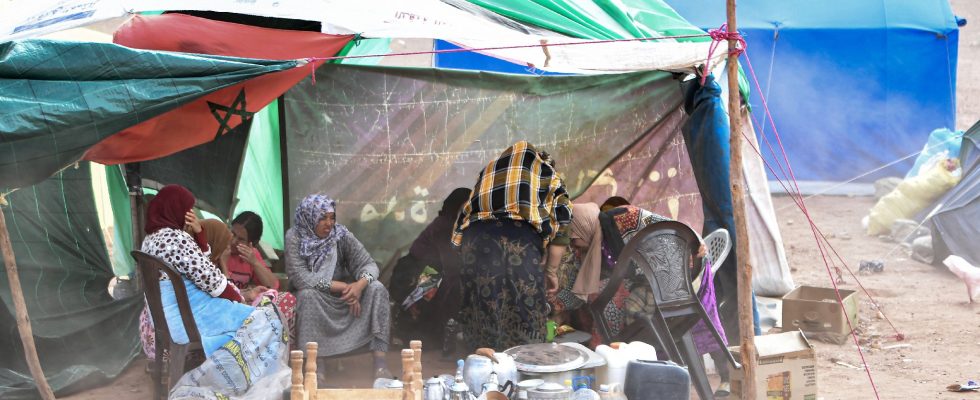We can hardly speak of an outburst of generosity. In a survey by the Ifop institute carried out exclusively for L’Express this week, the French people questioned were reluctant to provide financial assistance to the populations of Morocco affected by the earthquake. A minority – 22% – are considering or have made a donation. The disaster was particularly deadly: on September 8, a devastating earthquake left nearly 3,000 dead and more than 5,500 injured in the province of Al Haouz, a rural region located south of Marrakech. The scale of the earthquake, however, mobilized less people than previous disasters of the same magnitude. In a period marked by inflation, the French are less likely to make donations, whatever the subject.
In recent years, the French have indeed been less ready to open their wallets. The current survey figures are thus similar to those following the typhoon which struck the Philippines in November 2013 (26% of French people wanted to donate, 6% having already done so) or the earthquake in Nepal in April 2015 (32 % intention to donate, 6% having already donated). They are incomparable, however, with the mobilization in response to the earthquake in Haiti in January 2010. At the time, 49% of those questioned intended to provide financial assistance to the affected populations, and 17% of them had already participated.
Faster donations
“This is not the first time that a catastrophe of the magnitude of that in Morocco has occurred. The French watch, helplessly, as cataclysms repeat themselves,” explains Gautier Jardon, research fellow at Ifop. has, unfortunately, a rather terrible effect of weariness which sets in, and encourages you to give less, or even not to give.” Those who do so anyway are driven by incentives identical to those in previous disasters. In this case, the shock of the images showing the extent of the damage and the needs mobilizes them (56%). The call for donations launched by associations and charitable organizations only comes second (26%) and the possible proximity felt with the country and the population last (18%).
“In each disaster, the incentive vectors are similar: whether it is Haiti, Nepal or Morocco, the weight of photos and videos played a big role,” comments Gautier Jardon. In fact, the French donors were particularly generous. According to the associations, the outpouring of solidarity towards the victims was particularly marked. In less than 48 hours, Secours populaire collected 800,000 euros in online donations. The Fondation de France, for its part, collected 2.3 million euros in three days, three more than the donations made over the same period for the victims of the Turkish and Syrian earthquake (700,000 euros) in February.
Donors divided between city and countryside
What is the profile of these generous donors? In detail, the latter are almost as many men (22% answer yes) as women (23%). On the other hand, a clear difference is expressed in the gap between suburbs, cities and rural areas. The donor profile is almost evenly split between downtown (27%) and the suburbs (24%). Only 16% of those surveyed in rural communities say they are ready to give, compared to 29% of those in the Paris metropolitan area. Thus, 27% of donors live in Île-de-France, while their percentage barely exceeds 20% for the rest of the country. “Île-de-France is more internationally oriented, which partly explains this surge of solidarity,” believes Gautier Jardon.
Political orientations also have their role to play: most donors explain that they are left-wing sympathizers (35%), with those most willing to contribute financially identifying themselves as close to the Socialist Party (37%) then France Insoumise (34%). . Next come supporters of the right (28%), the presidential majority (17%) and, finally, the far right (13%, the lowest percentage falling to those close to Reconquête, Eric Zemmour’s party). . We also notice that Catholics are less ready to show solidarity (23%) than practitioners of another religion (45%), among whom there are French people of Muslim faith.
The profession of the donors is another element to take into account. Unemployed people tend to want to give more (24%) than working people (21%). But nuances exist in these two groups. Among the former, retirees show less willingness to contribute (21%) than “other inactives” (29%). Among the latter, employees and workers (26 and 24%) seem more willing to give than artisans or traders (14%). Income does not really seem to condition the donation: French people whose income ranges between 1,300 and 1,900 euros have almost as much intention to contribute (24%) as those who belong to the wealthy category (25%) or to the modest (23%) and poor (24%) categories. The upper middle classes (earning between 1,900 and 2,500 euros per month), on the other hand, are – slightly – the least willing to give (17%). A reaction which can also be explained by the economic situation, weighed down by inflation.
In an Odoxa survey carried out for Leetchi in October 2022, the French explained that they made fewer donations because they “can afford it less”. “Economic anxiety” linked to the war in Ukraine or the health crisis linked to Covid-19 pushed them to be more careful: 83% of French people declared that the context urged them to be cautious. They had thus shown less generosity, donating on average in 2022 around 200 euros to associations, or 7 euros less than the previous year.
